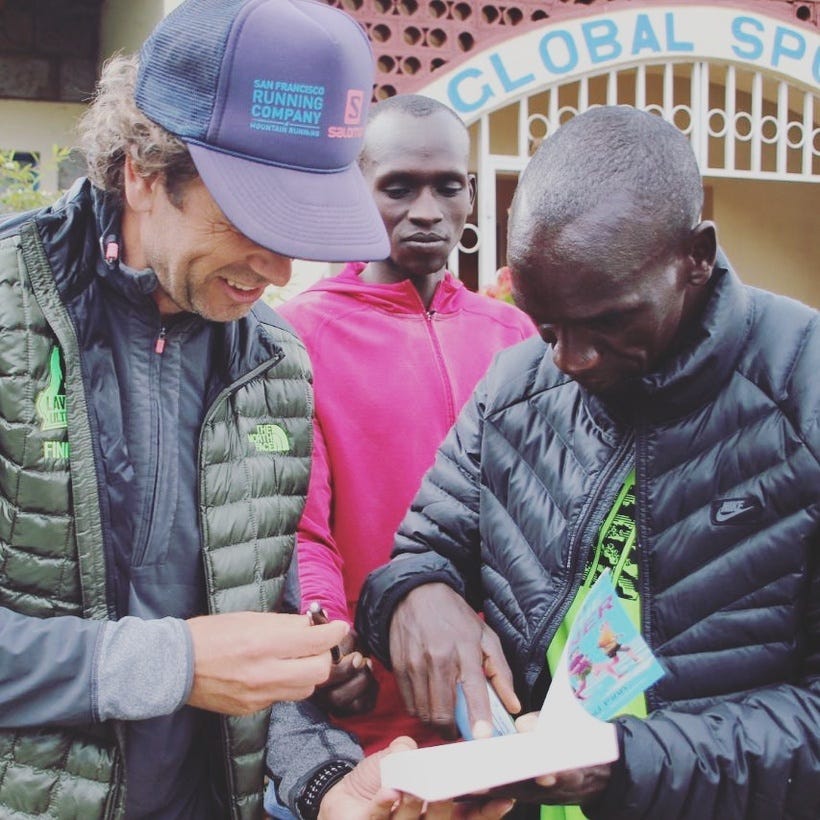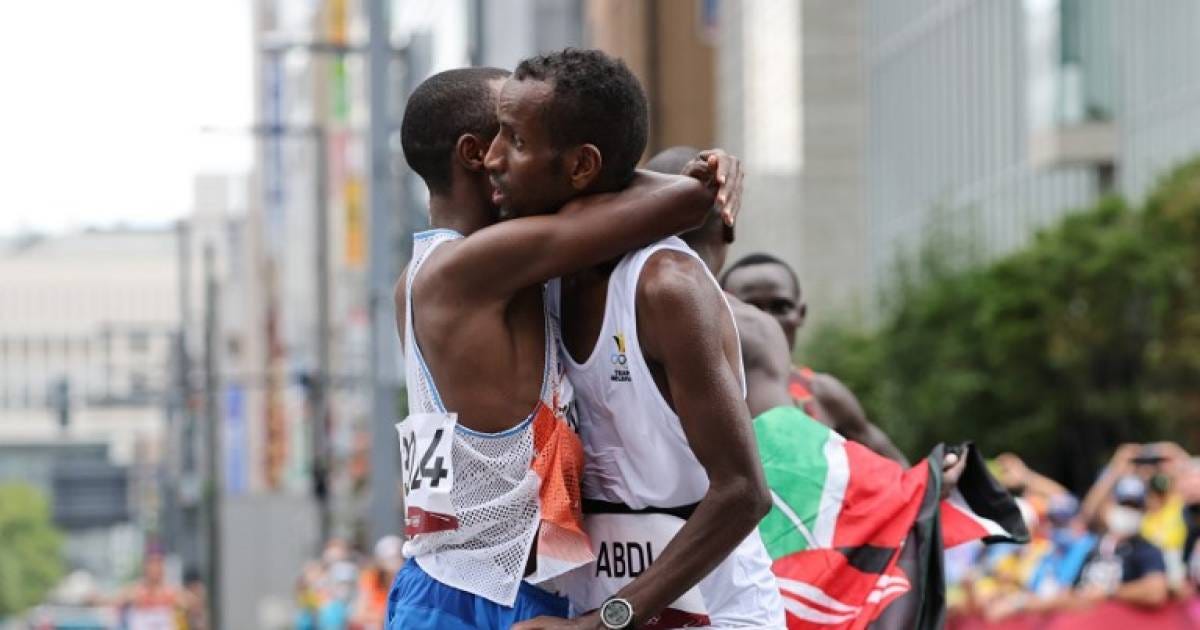My mate won silver!
This newsletter was first published on Patreon on 9 August 2021, as the Tokyo Olympics came to a close
Watching the men’s Olympic marathon on Saturday night, there were so many athletes I’d come across during my time as an author running in the front pack early on. I’d met the great Eliud Kipchoge a few times, when taking guests from my Kenya running holidays to visit his training camp in Kaptagat, where he was always smiling and welcoming, signing T-shirts and posing for photographs and chatting happily to everyone. One time I gave him a copy of one of my books as I know he likes to read, and he asked me to sign it, which was pretty cool. Someone even took a picture …
Also in that lead group in the early stages in Tokyo were others I had come across on my travels. The big Japanese hope, Suguru Osako, had been a Hakone Ekiden star when I was in Japan writing about that. At the back of the group was Callum Hawkins, with whom I once did a track session when he was in London. Just ahead of him was Zane Roberston, who had once asked me to write his life story - you may remember me writing about that?
But the only person running who I would really call a good friend was a Dutch-Somali guy I first met in a cafe in Iten, Kenya. Abdi Nageeye was sitting there in the Iten Club after lunch one afternoon, looking friendly and like he had lots of time on his hands. I was a journalist. So I approached him.
It turned out he was on a day off from his training camp, which just happened to be the same training camp in Kaptagat where Eliud Kipchoge lived. They were training partners, along with the Olympic marathon champion from 2012, Stephen Kiprotich, and the three-time world half-marathon champion Geoffrey Kamworor.
We got chatting and over the years, as I kept going back for my running holidays, we met up regularly and became friends. Last year I got him to come on my podcast.
His life story is fascinating, and if you haven’t listened to the podcast, then you really should. He’s warm, witty and insightful. He talks about the boredom of living in a Kenyan training camp, and he is unusually frank about the doping problems in Kenya.
Yet it is his own story that really takes your breath away. Twice as a child he escaped civil war in Somalia. After living in the Netherlands from the age of 11, his elder brother, who had become a little radicalised, sent Abdi to a madrasa in Syria because he thought he was becoming too Westernised. He then ended up in Somalia again, until, aged just 15, he escaped again, on foot and alone, making his way to Ethiopia, where he approached a Dutch family and asked them to adopt him.
Once in the Netherlands he became a top junior football player, on the fringes of making the national team. Then, one summer, just to stay in shape, his neighbours convince him to run a 5K. In his mind he thought it was too far and that he might die, but he gave it a go, and won easily. His neighbours were super excited, and got him to enter a big 10K in the nearby city. He turned up to find all these Kenyans and Ethiopians warming up. Intrigued, once the race started, he tried to run with them, and didn’t finish too far behind. Afterwards, the announcer asked him which club he ran for, so he gave the name of his football club, which caused some confusion. Less than a year later he was running for the Netherlands in the world cross country championships.
Abdi talking to guests on my Kenya running holiday
Even from there his story is full of twists and turns, but I urge you to listen to him tell it in the podcast. In any case, watching the marathon in Tokyo on my computer, I can’t see him, but the on-screen graphics are telling me that he’s in that big lead group somewhere. As the miles go by, the temperatures rocketing, the leading group sheds runners like a bird shedding feathers, until, when there are about 14 left, I suddenly see Abdi, running in the orange vest of the Netherlands.
Marietta, who feels she knows him too from listening to the podcast, is as excited as I am. As the group of 14 becomes 12, and then 10, he’s still there. Occasionally he seems to drop back a little and I think that’s it, but he always closes back up to the group.
Around 28km in, Kipchoge goes bang. He changes up into hyper-speed and, like the Millennium Falcon, he is gone in a flash, leaving a chasing group of four racing along. Four into two medals. The heat is on.
You would imagine the athletes in this group are now hoping that at least two of the others will drop off, leaving them in the front two and good for one of those coveted Olympic medals. So when the Spanish athlete and the Belgian athlete start dropping off the pace, leaving just Abdi and the second Kenyan athlete in contention, I’m leaping around in excitement.
As good as he is, Abdi was never supposed to be an Olympic medal contender. I didn’t see him mentioned in a single preview of the race - not even mine! So this is wild. In the podcast he talks about how when he first joined the group in Kenya the other runners were a little confused because he was so slow. (Compared to all the Kenyans, that is. Slow is a relative term there!) They must all be sitting in the camp in Kaptagat now scratching their heads, I think.
But what’s this? Abdi’s beckoning on the runners behind him to keep up. With about 5km remaining, just as he’s getting away, making that medal safe, he seems to be calling the runners behind him to catch up. What’s he doing?
The reason is that one of them is his friend and training partner, Bashir Abdi, also a former Somali refugee. “But still, come on,” I’m thinking. “Forget your mate, this is the Olympics, you need to push ahead, fight for that medal. You can be friends afterwards.”
Urged on by Abdi, Bashir makes it back to the group. So now they are three.
With just a few hundred metres remaining, they are all still locked in battle, when Abdi starts to speed up, overtaking the Kenyan. This is it! Go Abdi!
But wait. What is he doing? He’s looking behind him, urging Bashir to come with him. Even in the white-hot sprint finish of an Olympic marathon, after all those miles in that oppressive heat, that has wiped out half the field, he is calling his friend to come with him.
Pulled by an imaginary string, Bashir chases after Abdi, moving past the Kenyan, and together they cross the line in second and third.
As they embrace, all hugs and smiles, what didn’t make sense a few seconds ago, what seemed mad and perhaps even stupid, suddenly makes sense. Their shared experience as former Somali refugees, who had to flee their war-torn homeland, who had trained together for a year leading up to this race, was so strong that for Abdi it was vital that they both made it. He wasn’t thinking about individual glory. He wanted to share it with his friend - just as the two high jumpers had earlier in the Games. That meant so much more.
Abdi and Bashir embrace after winning silver and bronze.
It was one of the moments of the Olympics, and for it to be my friend Abdi, the cool dude from Kenya with whom I had spent many a Sunday afternoon, drinking coffee and listening to him tell funny stories about his Kenyan training partners … well, that just made it even more special.
The same evening, the Olympics closed with the marathon medal ceremonies at their heart. Not because it is the best event, but because somehow the essence of the Olympics, the heart and history of the Games, plays out over those 26.2 miles. And to see Abdi on the podium, jumping around joyfully, with his two friends, Eliud and Bashir, was just wonderful.
Yet, also, I know I wasn’t alone in feeling a little sadness watching the closing ceremony. Sadness that it was all over. After all the doubts, the concerns, the lack of spectators, the shadow of Covid, through it all Japan and the athletes had given the world an incredible show. In an age of cynicism, the Olympics somehow seems to brim over with a joyous, compassionate, uplifting spirit of togetherness. It gets me every time …
[Wipes tear from eye]
Anyway [regaining composure a little] … as a little addendum to my last musing, Kenya did indeed win fewer than 11 medals - 10 in total. It's telling that after they "only" won 13 medals in London 2012, there was a public inquiry back in Kenya to find out what went wrong. This time it was seen as a reasonably successful Games.



